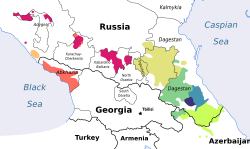This article has multiple issues. Please help improve it or discuss these issues on the talk page . (Learn how and when to remove these messages)
|
| Proto-Northwest Caucasian | |
|---|---|
| PNWC | |
| Reconstruction of | Northwest Caucasian languages |
| Lower-order reconstructions | |
Proto-Northwest Caucasian (sometimes abbreviated PNWC), also Proto-Adyghe-Abazgi or Proto-Adyghe-Abkhaz, is the reconstructed common ancestor of the Northwest Caucasian languages.
